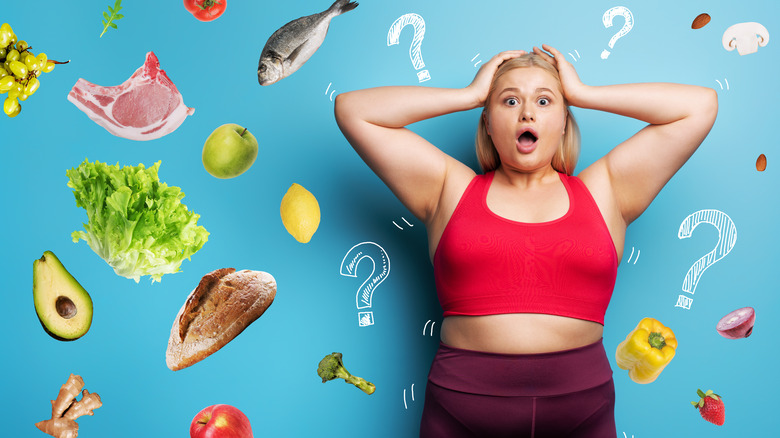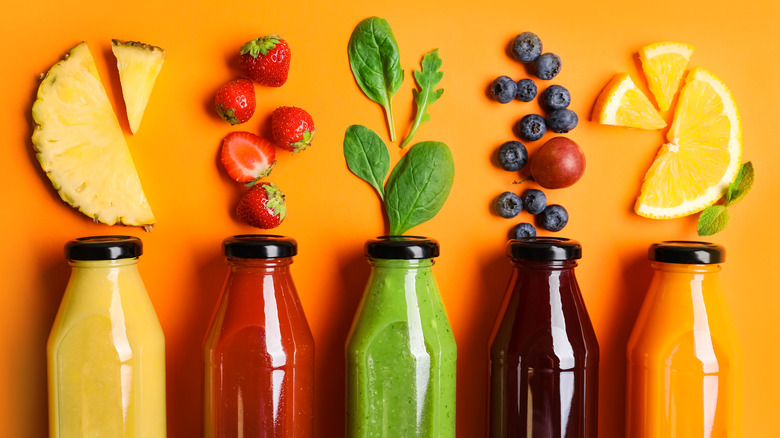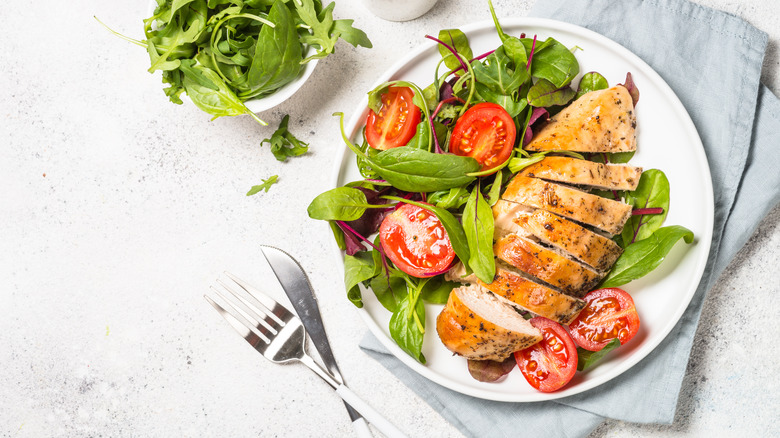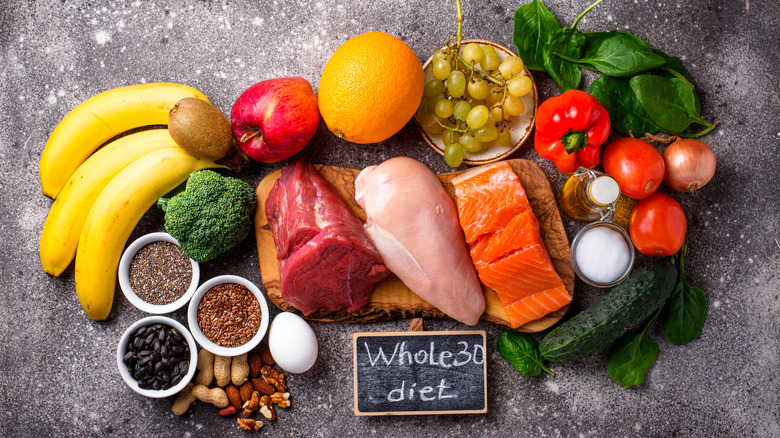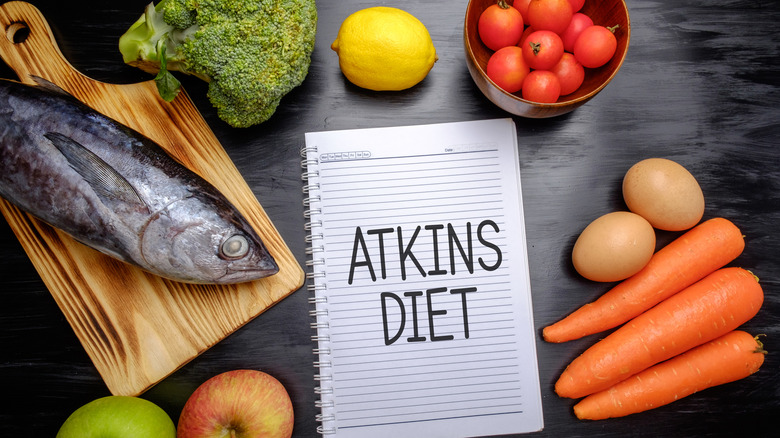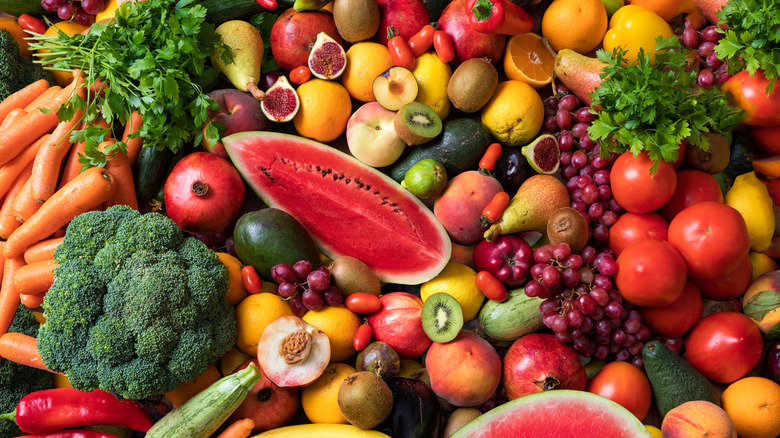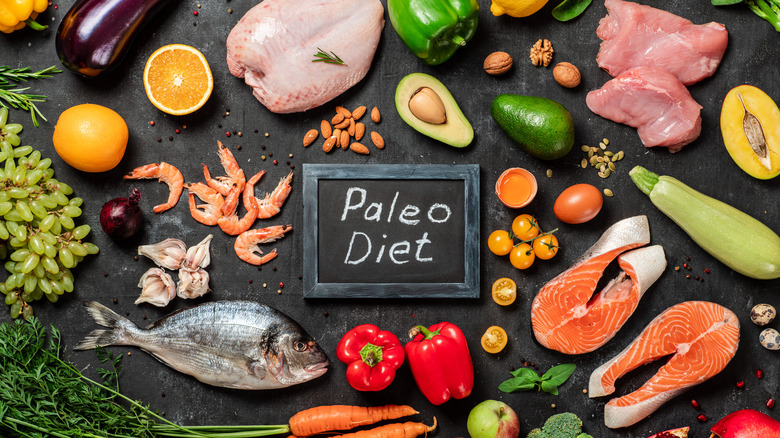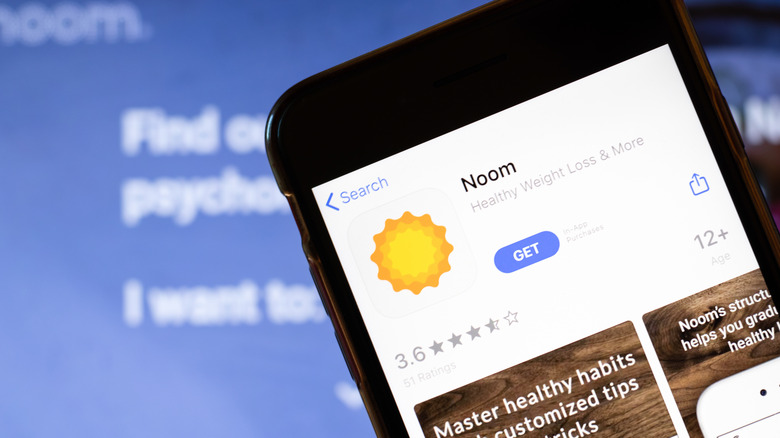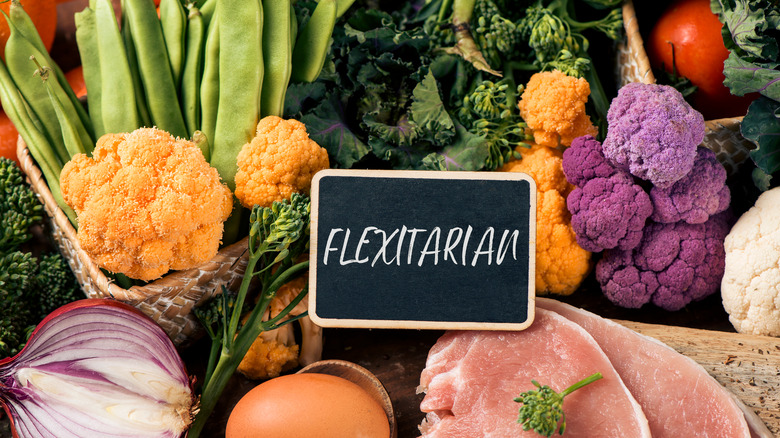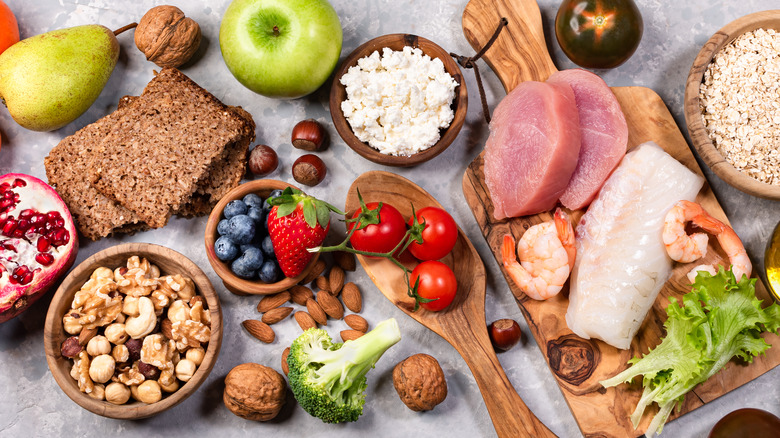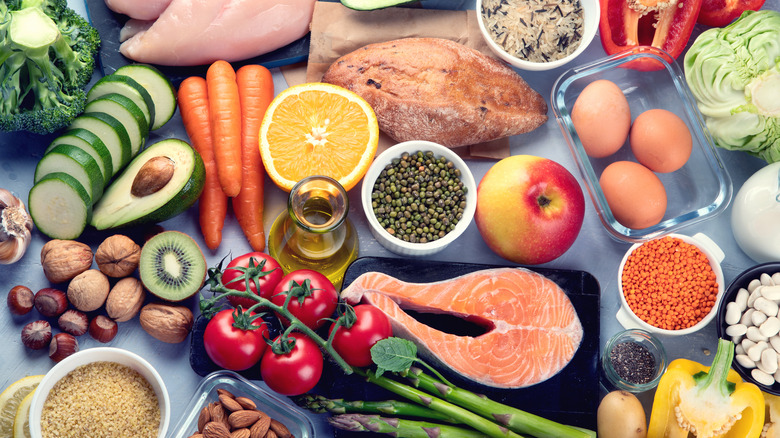Popular Diets, Ranked Worst To Best
We all know that maintaining a healthy weight is important. After all, it can lower your risk of developing various types of cancer, as well as diabetes, heart disease, high blood pressure, stroke, and other health hazards (via Harvard T.H. Chan School of Health).
When choosing a weight loss plan, keep in mind that most health experts recommend sustainable lifestyle changes over short-term diets. Some examples of beneficial changes include eating more whole foods, practicing moderation, and exercising regularly, according to Your Weight Matters. In general, be wary of any diet that is overly restrictive, cuts out entire food groups, or involves weight loss claims that sound too good to be true.
Although slow and steady weight loss is usually recommended for longer-term success, a 2010 study in the International Journal of Behavioral Medicine found that, in the context of making appropriate lifestyle changes, the initial rate of weight loss does not significantly impact whether this weight is eventually regained. In fact, a higher initial rate can lead to greater weight loss and long-term success overall. Therefore, you may wish to focus on "large rather than small behavioral changes during the initial weeks of treatment." To better explore weight loss plan options, U.S. News & World Report provides a list of best diets in 2022. And below, our list of popular diets, ranked worst to best, may help you decide which one is best for you.
Cleanse Diets
If you are considering any type of cleanse diet, we want you to be aware that this type of plan does not lead to long-term weight loss. In fact, Everyday Health includes cleanse diets on their list of worst diets for sustained weight loss, according to dietitians. In the article, Amy Goodson, RD, explains why doing cleanses for detox purposes is unnecessary, "Many people try these in the beginning of the new year, but there is zero science behind their health benefits. You do not need something to cleanse your body — that's what you have a liver and kidneys for."
According to Healthline, a standard cleanse (or detox) diet "involves a period of fasting," after which the person is only allowed to consume water, fruit and fruit juices, and vegetables. Some cleanses also include certain herbs, teas, supplements, and even colon cleanses or enemas. Although many proponents say cleanses can aid health conditions like obesity, digestive issues, autoimmune diseases, inflammation, allergies, bloating, and chronic fatigue, the reality is that scientific research fails to back up these claims.
Cleanse diets can also be harmful. Medical News Today reports on some of the risks involved, including not getting enough calories, protein, and fat for the body to function properly, the development of low blood sugar symptoms (fainting, weakness, headaches, etc.), and dehydration or electrolyte imbalance due to the use of laxatives and other methods of bowel stimulation.
The Dukan Diet
According to WebMD, the Dukan diet promises that you can "Drop 10 pounds in one week and never gain it back." However, please note that this high protein, low carbohydrate plan is tied for last place (#39) on the U.S. News & World Report of best diets overall. While on the initial phase of the diet, which lasts from one to 10 days, you can only eat from a list of 68 foods. After that, your options expand to 100 foods –– all protein and vegetables. You can eat as much of those foods as you'd like, along with 1.5 tablespoons of oat bran and at least 6 cups of water daily. Once your weight loss goal is achieved, you can begin to add in other foods.
Beyond all of this being highly restrictive, it may be harmful to your health. Medical News Today states, "The Dukan diet may contribute to weight loss, but research has linked it to possible health complications, including kidney disease and liver disease. Also, it may not provide the full range of nutrients the body needs." Bottom line? You may lose weight initially, but the Dukan diet doesn't teach longer term healthy eating habits. Don't be surprised if you gain it back.
The Keto Diet
Originally developed in the 1920s to reduce seizures in pediatric patients with epilepsy, the Keto (or Ketogenic) diet is now touted as a weight loss program (per Northwestern Medicine). The plan involves eating high-fat, low carbohydrate foods to obtain a state of ketosis, which is when the body burns fatty acids (or ketones) for energy instead of carbohydrates.
According to Melinda R. Ring, MD, there has been anecdotal evidence of this method leading to weight loss. On the plus side, "The keto diet allows many people to eat the types of high-fat foods that they enjoy, such as red meats, fatty fish, nuts, cheese and butter, while still losing weight." It may also help control blood sugar levels and provide health benefits for people with certain health conditions, including those with progressive neurological conditions like Parkinson's disease. Further research is needed to draw accurate conclusions.
On the downside, following the Keto diet may be difficult to sustain, lead to calorie depletion and nutritional deficiencies, have a negative effect on the heart (if too many unhealthy fats are consumed), and lead to food obsession, which can trigger a range of eating disorders. Newsweek also reports on the short term risk of developing "keto flu". This involves flu-like symptoms like upset stomach, headache, fatigue, and dizzy spells. You should be aware that the Keto diet is ranked #37 on U.S. News & World Report's list of best diets overall –– almost all the way at the bottom.
Whole30
The Whole30 program, ranked #35 among the best diets overall in U.S. News & World Report, claims that it can change your life in 30 days by eliminating food cravings, improving energy, sleep, allergies, anxiety, chronic pain, digestive issues, and skin conditions, and helping you lose weight healthfully and sustainably. According to the program's website, participants eat whole foods, along with eliminating added sugar, alcohol, grains, most legumes, dairy, and foods with carrageenan or sulfites for 30 days. During this time, you should not attempt to recreate or purchase "foods with no brakes" such as baked goods and treats –– even those made with Whole30 compatible ingredients. You should also avoid the scale completely.
Medical News Today explains, "By cutting out all of these foods for 30 consecutive days, proponents of the diet believe the body can heal from the underlying issues these foods may cause. In this regard, the diet would act as a reset button." Unfortunately, there are no current studies on the effects of the Whole30 program, so it is difficult to say whether it actually works. Additionally, this way of eating is challenging to sustain, especially beyond the targeted 30 days.
Julie Nutiflin, a writer for Health, chronicles her own experience doing a Whole30. While she describes an initial sugar withdrawal, getting creative in the kitchen, and eventual food boredom, she was also able to identify which foods were causing her stomach pains. Nutiflin plans to modify her diet accordingly going forward.
The Atkins Diet
The Atkins diet, one of the best-known low-carb diets, was ranked #1 among fast weight loss diets, but #34 overall (via U.S. News & World Report). Instead of restricting calories, participants must to keep their "net carbs” under a prescribed number (20, 40, or 100) to maximize weight loss. To this end, you eat foods from a list of foundation vegetables, proteins, healthy fats, and most cheeses, along with nuts and seeds. Over time, you can begin to add back in other foods. Oh –– and you don't have to exercise.
In a review, WebMD states, "When you're overweight, shedding pounds can improve your health, and we know the Atkins diet works. But it's still unclear how the higher amounts of animal protein and fat in the Atkins diet affect long-term health." The review also explains that people who eat mostly lean proteins, healthy fats, and high-fiber vegetables tend to do better on this diet than those who focus on animal fats and proteins (like butter and burger patties).
Many have wondered how it is possible to lose weight by eating this way. The Mayo Clinic explains, "Because carbohydrates usually provide over half of calories consumed, the main reason for weight loss on the Atkins Diet is lower overall calorie intake from eating less carbs." If you decide to give the Atkins diet a try, you should understand that sharply cutting carb intake can result in headaches, dizziness, weakness, fatigue, constipation, and other side effects.
The Raw Food Diet
Although aspects of the Raw Food diet are healthy (i.e. eating lots of fruits and vegetables), it fails to adhere to federal nutritional guidelines for a healthy eating plan (per Verywell Fit). Additionally, the diet's claims are not actually backed by science: "Proponents of the raw food diet suggest that cooking breaks down the enzymes in uncooked or "live food" which aid in the digestion and absorption of nutrients, but research supporting this claim is lacking. The human body produces its own enzymes to break down food, whether it's raw or cooked." Short-term weight loss may occur because most individuals on the plan consume only half of the calories they would eat on a cooked diet (via U.S. News & World Report).
Eating only raw food can lead to deficiencies in calories, nutrients, and protein. It also places you at increased risk for food-borne illness, may be difficult to sustain, and can lead to dangerously disordered eating. A Self article states, "Any time you take healthy eating to such an extreme, like trying to only eat raw foods, it's not a very realistic way to live." Bottom line: While eating more fruits, vegetables, and plant-based foods is healthy and recommended, there's no reason not to cook them.
The Paleo Diet
The Paleo diet is based on how prehistoric humans ate approximately 2.5 million to 10,000 years ago, before the agricultural revolution: "If cavemen didn't eat it, you shouldn't either" (via U.S. News & World Report). Proponents suggest that modern-day humans have been unable to adapt to the rapid introduction of more recent dietary staples (i.e. dairy, grains, and legumes), and that this "discordance" has given rise to health issues like obesity, diabetes, and heart disease (per the Mayo Clinic). To follow a Paleo diet, individuals should avoid dairy, grains, legumes, refined sugar, salt, potatoes, and highly processed foods. Instead, they can eat fruits, vegetables, nuts, seeds, lean meats, fish, and oils from fruit and nuts (like olive oil and walnut oil).
Clinical trials have suggested that the Paleo diet may provide health benefits when compared to some other diets. Potential benefits include more weight loss, along with improved glucose tolerance, blood pressure control, and appetite management. But not all health care professionals support the Paleo diet. Medical News Today explains why eliminating entire food groups can be problematic. For one, not eating dairy products can increase your risk for osteoporosis and bone fractures. Also, cutting out beans and legumes may deprive you of important minerals, fiber, and plant-based protein. While it is possible to get all necessary nutrients on the Paleo diet, doing this can be challenging and difficult to sustain.
Intermittent Fasting
Intermittent fasting is different from a traditional diet plan in that it focuses on when you eat, instead of on what. There are a number of different approaches, but they are all based on eating and fasting within certain time periods. "Intermittent fasting works by prolonging the period when your body has burned through the calories consumed during your last meal and begins burning fat," according to Johns Hopkins Medicine. One common approach is to always eat within a six to eight hour period each day. Another, known as the 5:2 approach, is to eat normally five days a week, but limit yourself to one 500-600 calorie meal on the other two days.
Potential benefits of intermittent fasting include improved thinking and memory, better heart health, and greater physical endurance. It may also help prevent diabetes and obesity. There are some potential pitfalls, though, including a high dropout rate (per Harvard Health). Dr. Frank Hu of Harvard T.H. Chan School of Public Health explains why, "It's human nature for people to want to reward themselves after doing very hard work, such as exercise or fasting for a long period of time, so there is a danger of indulging in unhealthy dietary habits on non-fasting days." In other words, you can lose weight if you actually stick with the plan, but if you binge and overeat during feeding periods, this may defeat your weight loss goals (via U.S. News & World Report).
Noom
Unlike some other diets, Noom takes a psychological approach to losing weight and living healthier. Per U.S. News & World Report, "Noom is about building self-awareness, accountability and habits that can lead to weight loss and healthy weight maintenance." But also, participants are steered towards low-calorie foods (primarily, whole grains, fruits, and vegetables), asked to track their food intake and adhere to a caloric budget, and provided with coaches for support and accountability. Most likely, you will lose weight when following this program.
Forbes describes how to get started with Noom's subscription based program. First, you take a quiz to develop a personalized plan. Next, you pay and download their app. (Note: a trial period is available for a nominal fee.) Then, you meet your coaches, receive your caloric budget, and choose how much time to commit each day for mini-lessons in psychology and behavioral change.
"The app may sound kind of tedious (who has time to read and take quizzes throughout the day?), but it could be the key to successful, sustained weight loss. The education elements that the app includes, like how it teaches you about calorie reduction and carbohydrate intake, as well as how to increase physical activity, have really important information if you want to lose weight in a sustainable way," states Women's Health Magazine.
The Vegetarian Diet
Following a vegetarian diet provides many important health benefits. It can be good for your heart, reduce cancer risk, prevent type 2 diabetes, lower blood pressure, decrease asthma symptoms, and promote better bone health (per Healthline). While these are all great reasons to cut out meat from your diet, be aware that vegetarianism does not necessarily lead to weight loss, if that is your main goal. You must also understand that just because someone is vegetarian doesn't always mean they are actually eating healthy: "If your vegetarian co-worker is noshing greasy veggie burgers and fries every day for lunch, is he likely to be healthier than you, who always orders the grilled salmon? Definitely not!" (via WebMD).
While a plant-forward diet can potentially improve your health, you will only reap the benefits if you're doing it properly. To get started, it may be a good idea to meet with a registered dietitian for guidance. According to U.S. News & World Report, there are several different types of vegetarianism. These include lacto-ovo (allows dairy products and eggs), lacto-vegetarians (allows dairy but not eggs), ovo-vegetarians (allows eggs but not dairy) and veganism (excludes all animal products). No matter which type you select, a dietitian can help you plan for adequate nutrition. Expert tip: If you're trying to lose weight, be sure to limit calorie-laden nuts as a protein source. Nuts are healthy in moderation, but it takes an awful lot of them to meet the body's full protein requirements.
WW
No food is off limits with WW, formerly known as Weight Watchers. In the popular diet's latest iteration, WW assigns points values (known as "PersonalPoints") to different foods and drinks, along with building a custom plan for each participant. The plan includes a daily points budget based on the individual's nutritional needs and weight loss goals, along with a range of zero-points foods like fruit and vegetables, yogurt, whole grains, seafood, poultry, and eggs. You can earn extra points by eating non-starchy vegetables, drinking water, and exercising. The program can be self-guided or involve coaching sessions for support and accountability. There is also an active online community.
The PersonalPoints system is an easy way to control portion sizes and caloric intake. And if you're not a fan of cooking, WW also offers pre-made meals and snacks, making it even easier to follow the diet. "Overall, it's an excellent, personalized program that focuses on wellness and building healthy habits. Weight loss is just a part of it. The WW program meets you where you are on your journey and helps you create a community of support" (per WebMD). WW is tied for #1 best diets for weight loss and #5 best diets overall (via U.S. News and World Report), so we definitely give it a thumbs-up.
The Flexitarian Diet
The Flexitarian diet offers a plant-forward approach to eating, with more flexibility than a strict vegetarian or vegan plan. (Note how the name itself is a combination of "flexible" and "vegetarian.") Its overall goal is for you to eat more nutritious plant-based foods while reducing your meat intake (per Healthline). The Flexitarian diet is tied (with the DASH diet) for #2 in best diets overall (via U.S. News & World Report).
"DASH emphasizes hefty amounts of fruits and veggies at every meal, along with lean meats, seafoods, whole grains and low fat dairy products. Added sugars are limited but not forbidden, meat-free meals are encouraged, and herbs and spices take the place of salt to boost flavor without sodium," reports Food Network.
You can find more details and specific recipes in "The Flexitarian Diet," written by dietitian Dawn Jackson Blatner (via WebMD). The book also offers a short eating habits assessment that helps determine how best to get started. Depending on how many times a week you eat meat, you may wish to follow a beginner, advanced, or expert program. This allows for a gradual shift towards healthier eating habits.
The DASH Diet
Among the top-rated diets in 2022, the DASH (Dietary Approaches to Stop Hypertension) diet was designed to lower blood pressure and LDL (bad cholesterol) levels (per U.S. News and World Report). It is heart healthy, nutritionally sound, and can also help people lose weight.
According to the American Academy of Family Physicians, the plan "promotes a balanced diet and portion control. It encourages introducing more fruits and vegetables, whole-grain foods, fish, poultry, nuts, and fat-free or low-fat milk products into your daily diet. It recommends reducing foods high in saturated fat, cholesterol, trans fats, sweets, sugary drinks, sodium (salt), and red meats."
Followers of the DASH diet are also encouraged to avoid processed foods, seek healthy alternatives to "junk foods", and increase their intake of magnesium, calcium, and potassium (via Medical News Today). Other dietary tips include having small portions often throughout the day, eating less meat and more fruits, vegetables, and whole grains, and selecting fruits or vegetables to snack on instead of candies or chips. There is both a standard and low-sodium version of the diet; talk to your medical provider about which is right for you.
The Mediterranean Diet
Ranked #1 among the best diets overall by U.S. News and World Report, the Mediterranean diet provides a sustainable, healthy eating plan that can boost your health: "The Mediterranean diet may offer a host of health benefits, including weight loss, heart and brain health, cancer prevention, and diabetes prevention and control. By following the Mediterranean diet, you could also keep that weight off while avoiding chronic disease." The Mediterranean diet also claimed the #1 spot in the following categories: best plant-based diets, best heart-healthy diets, best diabetes diets, best diets for healthy eating, and easiest diets to follow.
Healthline explains that there isn't just one Mediterranean diet plan. It is more of a dietary approach based on traditional foods eaten in Greece, France, Italy, Spain, and other countries bordering the Mediterranean Sea. In this region, people were notably healthier and less impacted by chronic disease. Recommended foods include fruits, vegetables, whole grains, legumes, nuts, seeds, heart-healthy fats, and seafood. Poultry, eggs, cheese, and yogurt can be eaten in moderation; red meat, processed foods, added sugar, and refined grains should be avoided. Red wine can be included if desired, but only around one glass per day.
To get started, the Mayo Clinic recommends: "Build meals around vegetables, beans and whole grains. Eat fish at least twice a week. Use olive oil instead of butter in preparing food. Serve fresh fruit for dessert." It is also important to be physically active and savor your meals with others.

